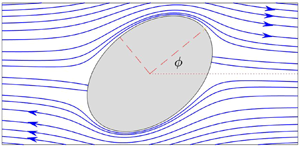Article contents
Equilibrium tilt of slippery elliptical rods in creeping simple shear
Published online by Cambridge University Press: 18 November 2021
Abstract

It is shown that shape anisotropy and intrinsic surface slip lead to equilibrium tilt of slippery particles in a creeping simple shear flow, even for nearly shape-isotropic particles with a cross-section that is close to circular provided the Navier-slip length is sufficiently large. We study a rigid particle with an elliptical cross-section, and of infinite extent in the vorticity direction, in simple shear. A Navier-slip boundary condition is imposed on its surface. When a Navier-slip length parameter  $\lambda$ is infinite, an analytical solution is derived for the Stokes flow around a particle tilting in equilibrium at an angle
$\lambda$ is infinite, an analytical solution is derived for the Stokes flow around a particle tilting in equilibrium at an angle  $(1/2)\cos ^{-1}((1-k)/(1+k))$ to the flow direction where
$(1/2)\cos ^{-1}((1-k)/(1+k))$ to the flow direction where  $0 \le k \le 1$ is the ratio of the semi-minor to semi-major axes of its elliptical cross-section. A regular perturbation analysis about this analytical solution is then performed for small values of
$0 \le k \le 1$ is the ratio of the semi-minor to semi-major axes of its elliptical cross-section. A regular perturbation analysis about this analytical solution is then performed for small values of  $1/\lambda$ and a numerical continuation method implemented for larger values. It is found that an equilibrium continues to exist for any anisotropic particle
$1/\lambda$ and a numerical continuation method implemented for larger values. It is found that an equilibrium continues to exist for any anisotropic particle  $k < 1$ provided
$k < 1$ provided  $\lambda \ge \lambda _{crit}(k)$ where
$\lambda \ge \lambda _{crit}(k)$ where  $\lambda _{crit}(k)$ is a critical Navier-slip length parameter determined here. As the case
$\lambda _{crit}(k)$ is a critical Navier-slip length parameter determined here. As the case  $k \to 1$ of a circular cross-section is approached, it is found that
$k \to 1$ of a circular cross-section is approached, it is found that  $\lambda _{crit}(k) \to \infty$, so the range of Navier-slip lengths allowing equilibrium tilt shrinks as shape anistropy is lost. Novel theoretical connections with equilibria for constant-pressure gas bubbles with surface tension are also pointed out.
$\lambda _{crit}(k) \to \infty$, so the range of Navier-slip lengths allowing equilibrium tilt shrinks as shape anistropy is lost. Novel theoretical connections with equilibria for constant-pressure gas bubbles with surface tension are also pointed out.
JFM classification
- Type
- JFM Rapids
- Information
- Copyright
- © The Author(s), 2021. Published by Cambridge University Press
References
REFERENCES
- 3
- Cited by



